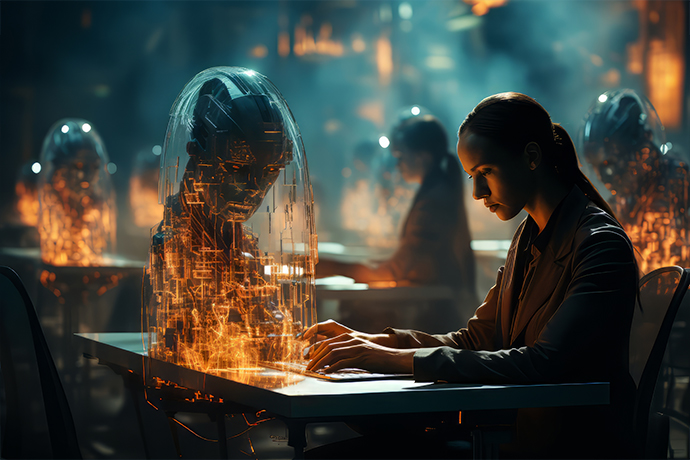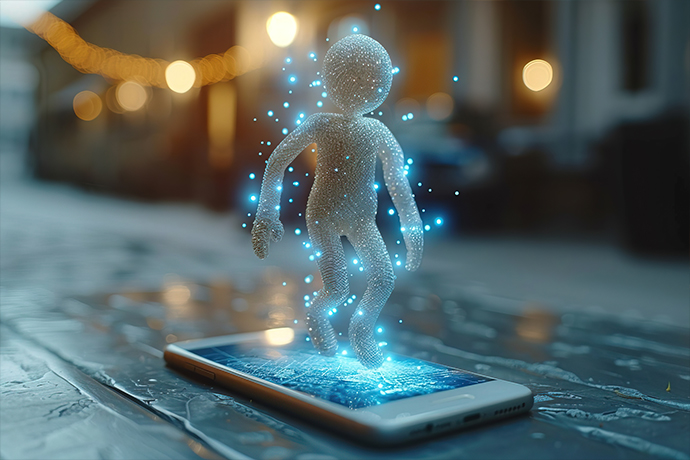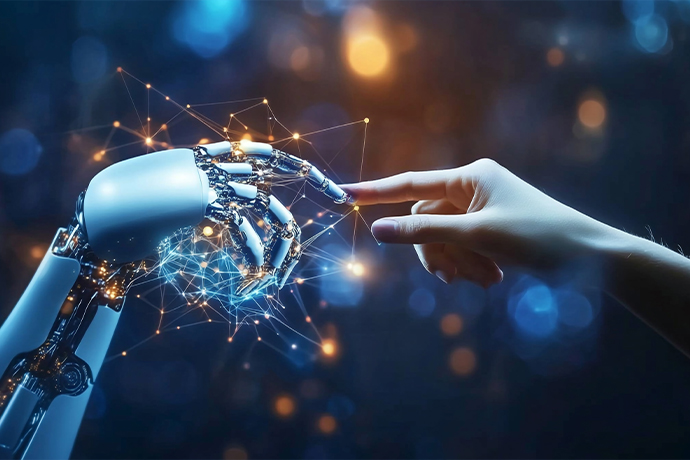 SPEAKERS
SPEAKERS
 TOPICS
TOPICS
How is the convergence of technology and humanity reshaping our interactions, changing our work and life, and challenging our ethical perspectives? Let’s find out.

At a time when technology surges forward with no looking back, the juncture of technology and humanity creates some deep opportunities and challenges.
Picture a world in which artificial intelligence works harmoniously with human creativity, in which biotechnology extends life, and in which digital platforms unite people all over the world at the speed of speed. This fusion of technology and human potential is transforming everything from health care and education to employment and social relations. We need to penetrate the depths of both negative and positive impacts while traversing through this transformation age.
How do these changes re-outline our notion of being human? In this paper, we will discuss the dynamic interaction that has been prevailing between technology and humanity and exciting possibilities or ethical considerations that come with this unprecedented fusion.
How has human-technology interaction evolved over the years? Initially, technology was used as an extension of simple tasks, from wenches and levers through the abacus and to the first days of computing. However, modern days came with technology developed from such uses. Human beings entirely depend on smartphones, smart homes, and wearables for the management of common life. Such integration makes one ponder their over-reliance on the technology that molds their identities and interactions.
A major milestone in this progression is the fusion of AI with human activities. Artificial intelligence can make us super powerful, from enhancing health diagnostics to automation for complex industrial operations. Will it change your job or daily life in ways you never even imagined? Embracing transformative technology can mean raising our businesses' efficiencies and fostering an innovative spirit. However, it also poses ethical considerations, such as those of privacy and the need for responsible AI development.
Digital transformation continues to redefine new boundaries for interaction between humans and technologies. Virtual reality, or v-reality, including the combination with augmented reality, is framing living experiences and environments themselves. In these possibilities, challenges emerge for us to remain ethically appropriate. Are we ready to handle the societal impacts of rapid technological change? Balancing innovation with ethics optimizes technology to serve humanity positively and sustainably.

Have you ever wondered how AI and humans can work together to shape the future? The collaboration between AI and humans, as highlighted by experts like Anton Musgrave and Will Higham, is transforming various industries and fostering innovation. Musgrave, a specialist in technology and the future of work, emphasizes the importance of integrating AI to enhance human capabilities, from automating routine tasks to solving complex challenges more efficiently. Higham, a leading voice in digital transformation, also underscores how AI tools can empower creativity, enabling businesses to thrive in a rapidly evolving landscape.
AI’s ability to augment human creativity is already evident in sectors like healthcare, where AI assists doctors with diagnosis, or in logistics, where it optimizes supply chains to reduce waste. These examples are just the beginning of a future where AI-empowered creativity plays a pivotal role.
However, this collaboration also raises critical ethical concerns. How do we ensure that AI respects privacy and is free from bias? As Musgrave often points out, establishing clear ethical frameworks for AI development is crucial to avoid misuse and ensure technology serves humanity responsibly. Higham adds that companies and governments must collaborate to create regulations that balance innovation with ethical responsibility.
A collaborative future with AI and humans will require constant adaptation to new technologies and their societal impacts. Education and training will be key in preparing the workforce for these changes. As Higham advocates, staying curious and ready to learn new skills will help individuals and organizations thrive in an AI-driven world.
A collaborative future with artificial intelligence and humans would be one of eternal adaptation to new technologies and their consequences. Education and training play critically enriching roles in preparing a workforce for changes induced by AI. But have you ever wondered what impact digital transformation may have on your career? It is staying curious and ready to learn new skills that will help you thrive in this shifting landscape. Long-term AI-human collaboration can foster a more innovative, efficient, and ethically awake world.
From the way of communication to every thread of daily activities, the path of digital transformation engulfs almost everything. One very significant point that digital transformation speakers normally emphasize and focus on is how technology streamlines workflows, boosts productivity, and raises living standards. You will agree that remote work tools and virtual platforms help in keeping up with your team easily from wherever you may be. A more flexible way to work and live, it better helps you in your professional and personal life balancing.
The world is picking digital transformations at fast speed. New opportunities for innovation are also birthed. Business entities operating in a dynamic landscape need to leverage relevant digital solutions to create efficiencies and customer experiences.
For instance, AI in consumer behavior analysis determines the exact marketing strategies and therefore offers better results. Digital transformation speakers lay emphasis on keeping up with technology to drive growth so that one can stay relevant in the best possible manner in an ever-changing market.
Certainly, how much sense these developments need to be considered is accompanied by a lot of questions and challenges. The innovations must therefore be at par with the concerns of privacy and secured data.
This is why most digital transformation speakers remind one of the importance of ethical guidelines in ensuring no one is left behind in the dispensation of technology. You can contribute to shaping a future in which digital transformation improves your way of working and living by keeping yourself up-to-date and proactive.
Great power, great responsibility in the faster progress age. If ethical innovation does not come up, privacy can be compromised; data is misused, and society is affected because of unforeseen contingent results. You ever wondered what would happen if technology grew without checks? Choosing ethics first ensures you're actively working towards a future where technology improves lives but at not a cost to your values.
This need for innovation must be associated with solid ethical guidelines and a sense of responsibility. Transparency, accountability, and inclusiveness ensure that technological achievements stay for the good of all. To this end, in keeping yourself updated and able to influence ethical behavior, you have the power to help find equilibrium: innovation with integrity. Only then will proper trust be built as the technological progress is wrought in line with the greater good for a sustainable future of equity.
The intersection of technology and humanity brings limitless growth, innovation, and space for improvement. Implementing digital transformation while aiming at synergies of AI and humans, with ethics on the top of our agenda, will be giving ourselves a future that makes life richer in experience without meddling with our values.
Be it at the level of tackling intricacies of work and life or higher societal effects, the need is to keep ourselves informed and proactive. Together, let us seek to harness technology in making a more connected, effective, and ethical world.
